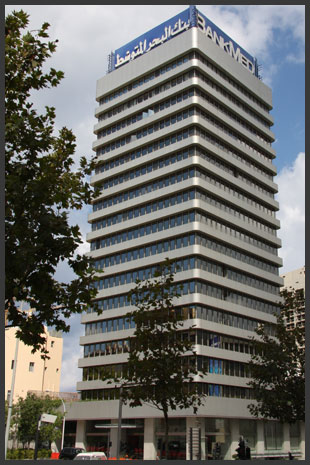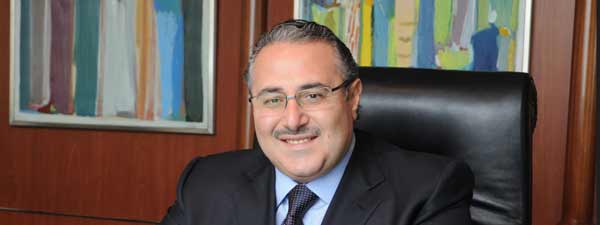Top Bank in the Middle East
My aim is to increase our equity, which has doubled since 2005. Also, I would like to double our assets and be a leader in the strategic business lines we have targeted.
It is quite normal for the IMF to forecast lower growth in 2010, this is because the Lebanese economy will stabilize in 2010 to absorb the high growth achieved in 2009. I think the growth will remain healthy as long as political and security conditions remain stable.
Is this growth sustainable for the long-term?
 Between 2005 and 2006 Lebanon witnessed several security and political shocks which resulted in almost-stagnant growth during the period. We missed out on some growth-opportunities occurring elsewhere in the world, especially at a time when the region was awash with liquidity from the soaring oil prices. Nevertheless, when things returned to normal in 2008 we were able to record high growth rates while the rest of the world battled a global financial and economic crisis. I believe that the sound structure of our economy and a healthy banking sector will ensure sustainable growth as long as political and security stability is ensured.
Between 2005 and 2006 Lebanon witnessed several security and political shocks which resulted in almost-stagnant growth during the period. We missed out on some growth-opportunities occurring elsewhere in the world, especially at a time when the region was awash with liquidity from the soaring oil prices. Nevertheless, when things returned to normal in 2008 we were able to record high growth rates while the rest of the world battled a global financial and economic crisis. I believe that the sound structure of our economy and a healthy banking sector will ensure sustainable growth as long as political and security stability is ensured.
Fitch ratings have upgraded Lebanon’s short and long term currency default rating to B from B-. What is your overall assessment of the banking sector in Lebanon ?
Fitch was not the only the ratings agency that upgraded the rating. The banking sector in Lebanon is one of the strongest in the region, based on solid fundamentals namely high liquidity, strict and stringent regulation by the central bank and strong policies that have been evolving in line with market needs and trends. The sector represents the backbone of the Lebanese economy .
What has been the lesson learned in the banking sector as a result of the crisis?
We have come to appreciate the merits of strong fundamentals and sound banking. Excessive leverage, loose credit policies, and diversion from common sense became the norm in banking. But now, we see a reversion back to the fundamentals. Fortunately, the Central Bank in Lebanon did not allow Lebanese banks to deviate from the sound banking practices; by reinforcing the fact that our basic duty is to protect our depositors and grow our banks prudently while maintaining high liquidity and avoiding toxic investments.

Do you see the world going back to the fundamentals or do you think the bailout allows them to go back to their old ways?
I would say that public pressure is pushing the banks to go back to the fundamentals and avoid the same mistakes. Banking is very simple if you do the right thing. In Lebanon, investment banks are doing well but they do not impact the balance sheets of the banks and this is largely due to the strict regulation and oversight of the system imposed by the Central Bank .
Do you think the real estate sector in Lebanon is overvalued and do you think that the local banks have high exposure to this real estate?
Lebanon is a unique example when it comes to real estate . Lending for real estate is relatively low in all banks’ portfolios because it is usually financed by pre-sales, whereby the developers get financing mainly from the buyer, and other sources.
“Today I think we are at the peak, as compared
to the rest of the world, when it comes to value.”
However, Beirut is a special case because there is a shortage of supply and land is limited; therefore we anticipate that real estate prices will freeze, not decrease. Outside Beirut, market forces of supply and demand, demographics, and location are more significant.
What are you priorities for Oger Group and what is your strategic direction and what kinds of business would you like to develop? Which markets are you targeting?
We are diversified in several industries and regions and this was the vision of Rafic Hariri, the late Prime Minister of Lebanon who was also the founder of the group. We are in telecommunication in Turkey and there we own 55% of Turk Telecom, the largest telecommunications company in Turkey. In South Africa we own Cell-C and in Saudi Arabia, Jordan, and Lebanon we own an internet company called Cyberia. The telecom business is very important for us and is our vision for the future. It has been very lucrative and we will continue to expand in this industry whenever viable opportunities present themselves. For the moment, we are in stabilization-mode, mostly because of low global growth rates during the crisis, but we are looking forward to witnessing an upswing in growth in the near future. We are open to going into any region. The Group is also involved in the construction sector . The largest share of our construction activities is in Saudi Arabia, where Saudi Oger is headquarter, and produce about $4 to $5 billion of construction work per year in Saudi Arabia, Dubai and Abu Dhabi. We believe the Gulf region is our niche where we can do our best work, and have therefore not pursued construction work elsewhere. We are also interested in power generation and we are currently operating a project in collaboration with an international power company from the UK and with Saudi Aramco and we are bidding on other projects in the meantime.
In terms of the strategic direction how do you see the future of the company? Is it more in diversification or specialization?
We will seek to diversify our operations within the industries where we are already active namely, in construction, telecommunications, banking and power generation in addition to real estate.
Are you looking to be a market leader?
We are considered one of the largest in Saudi Arabia, and aspire to be the leader in every market we enter. Rewarding and profitable ventures are also one of the major objectives of the Group.
Can you give us a brief on your strategy for BankMed and how do you plan to use the excess liquidity?
The excess liquidity will basically go to serving the local market, where we see many opportunities on both the corporate and retail side. Over the past five years we have grown BankMed into one of the top five banks in the country, compared to 12th in 2005. We try to be careful with liquidity due to the unexpected political situation in Lebanon, so as to ensure that we are prepared in case of any shock. All banks in Lebanon adopt a similar policy. We do, however, look for good quality assets to lend to or take up; and this is where local banks compete most intensely. We look at acquisitions very carefully and will continue to pursue an expansion strategy, to create a more successful business enterprise, through carefully calculated vertical integration and well designed horizontal expansion.
What is your strategic vision for BankMed?
“Today we are well-positioned to move on to
the next stage and we are looking at alternatives.
My aim is to increase our equity, which has doubled since 2005.”
Also, I would like to double our assets and be a leader in the strategic business lines we have targeted. We are considering opening up our capital to outsiders but this is in the very early stages of planning. Further, we would like to consolidate our banking operations which are currently split across the region.
How would you like to consolidate these activities?
Though cooperation and synergies. We have no intentions for mergers.
How would you define your greatest challenge?
It is progress and growth. The late PM created an empire and unfortunately was assassinated during the prime of his political and business career. His son, Saad, has taken over in the midst of very difficult times. We have been able to assist him on the business side and I believe we succeeded in optimizing the business.
|
Get the Flash Player to see this player.
|
“We also believe in “people business“, it is not
just profit based. We believe employment and
opportunities for people will help the social situation
immensely, as well as our overall
Corporate Social Responsibility program.”
What is your final message about Lebanon?
The biggest asset for Lebanon is its human resources. We have a highly educated and skilled workforce and a talented business community. Our only drawback is the potential vulnerability of the political situation, but once we overcome this obstacle, the sky is the limit for Lebanon!